After two years, is No Man's Sky everything Hello Games originally promised?
Hello Games' procedurally generated creation is better than ever after two years of persistent updates
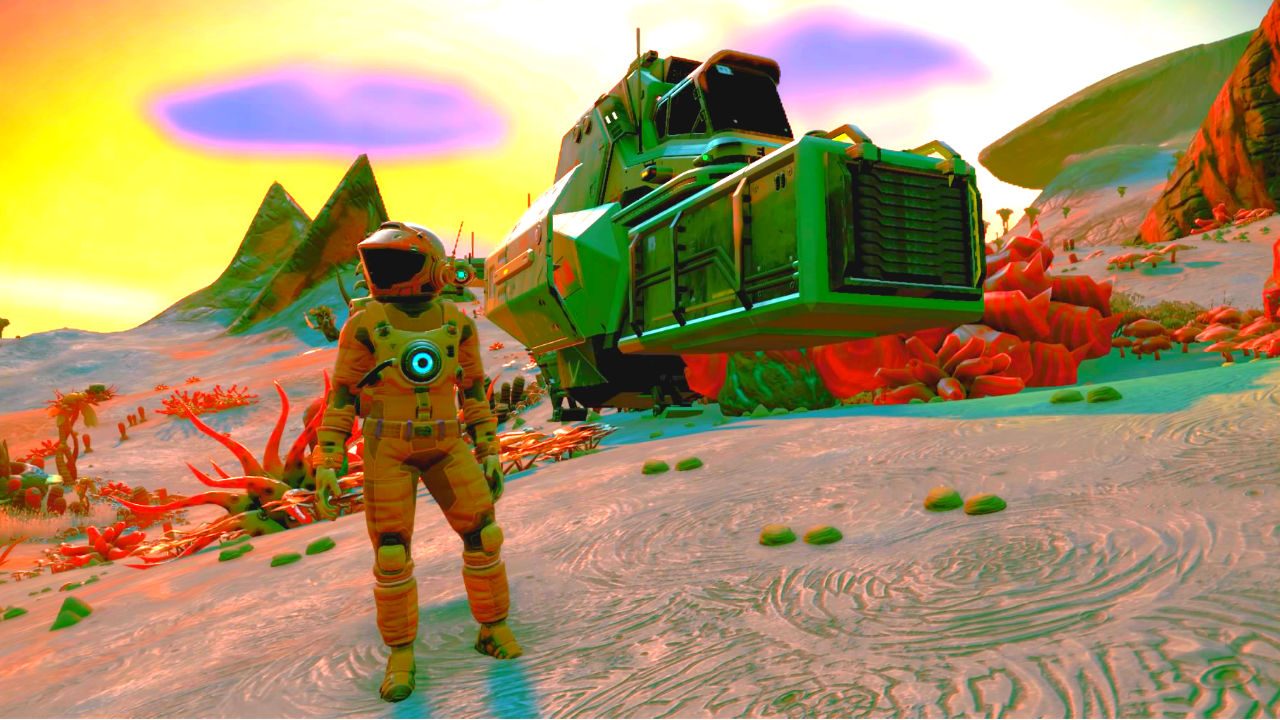
When No Man's Sky first launched the word that was mostly associated with it was "frustrating". It's a sentiment shared by the original GamesRadar No Man's Sky review, which noted that it played more like a space management sim than a space exploration sim, with clunky, badly explained menu systems and worlds that felt more like a variation on a theme than unique, intricate, procedurally generated planets. Everything you were doing had no focus, and the constant management felt like a tiresome distraction that stopped you doing the fun stuff.
First played: August 2016
What is it? Procedurally-generated space exploration sim
Developer: Hello Games
Formats: PS4, Xbox One, PC
Why are re-visiting the game? The new No Man's Sky Next update
But with multiple major updates under its belt, No Man's Sky has changed for the better, most notably with the latest, and most ambitious, No Man's Sky Next expansion. On its two-year anniversary, it's time to look back over the game's evolution to see how it's changed and whether it lives up to the promises Hello Games made way back at that first E3 debut in 2015.
What we said then
"More generally, there’s an intangible sense of everything in No Man’s Sky being illusory. For its many moments of spectacle, it’s never nourishing in the same way as The Witcher 3 or Skyrim. At any moment, it feels like you could pierce the veil of space and see raw code. Instead of being liberating, the near-infinite scale actually makes No Man’s Sky feel strangely claustrophobic. There’s something reassuring about hitting the walls that surround most open world games - you can turn around and appreciate what’s actually there - but No Man’s Sky, by comparison, can feel hopeless, like being stranded in an endless sea."
What's changed?
When No Man's Sky launched back in 2016, it came burdened with an insurmountable helping of promise. ‘Procedural generation’ wasn't a term that had been bandied about much before, especially not on the scale of No Man's Sky, and because of that people expected a literal universe filled with the kind of diversity, interactivity, and, ultimately, endless content and exploration that Hello Games had been promising. It was an ambitious project, and very much backed by Sony to be one of the biggest PS4 releases at the time, but although that ambition was there, many claimed the full game was not. This particular star trek started like a beautiful, but utterly flawed, masterpiece that sparked rows about Steam refunds, and false advertising, but in reality was the start of a beautiful, star crusted adventure.
Since all that furore, creator Sean Murray has come out of hiding, and the game has had numerous updates that fundamentally change the way the game works. The first update, the Foundation, introduced new Creative and Survival modes (and Permadeath, which I will never touch) to compliment the normal mode, along with base building, farming and freighters, which appear as huge, hulking great things in each galaxy, making each star-filled feel more alive and part of a connected world.
What do we think now?
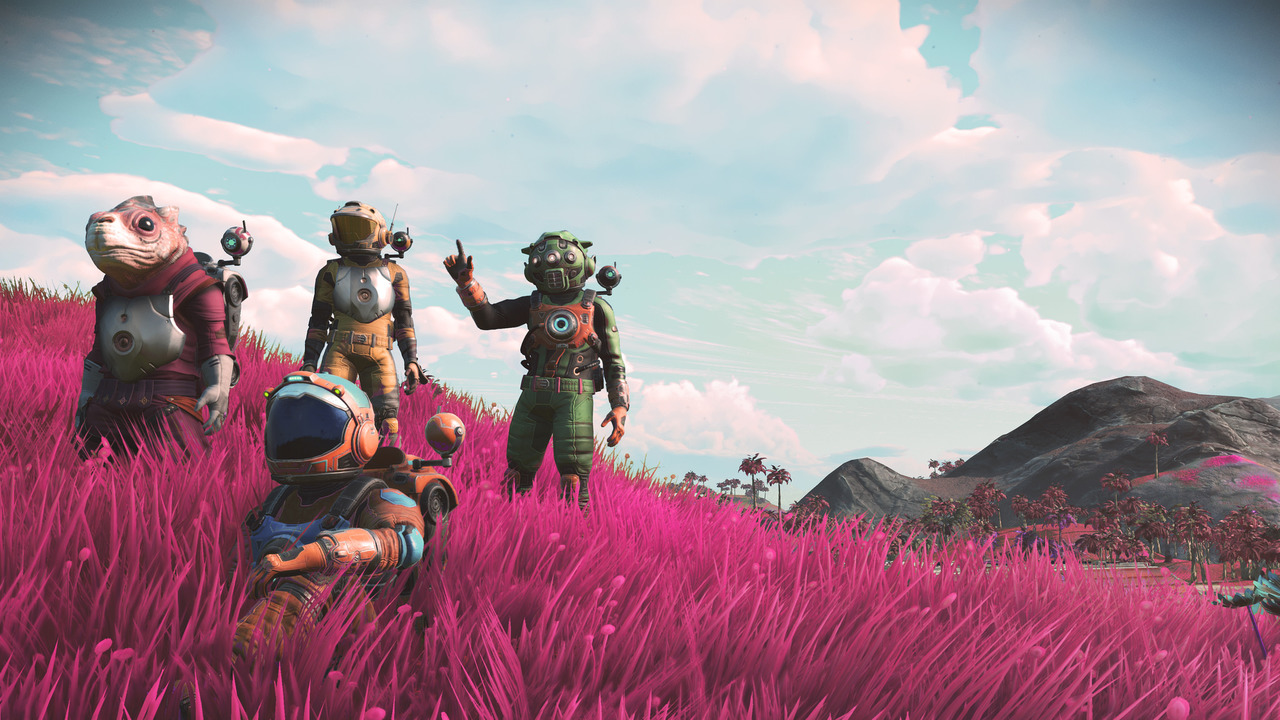
In space nobody can hear you scream. Nobody can hear you scream as you fly across the surface of the perfect planet for the upteenth time, scanning for the very specific computer you need to restore your legacy base. Oh, just me? It's been a long journey across the universes, of patches and updates galore, for No Man's Sky. But I can say the very same thing for the team over at Hello Games, because this iteration of No Man's Sky, aka No Man's Sky Next, has been two years in the making, and boy has it been worth the wait.
Each major, and totally free, update has slotted in another jigsaw piece in the puzzle that is No Man's Sky, making it more and more complete by the day. The team is still furiously patching out bugs and quirks that have arrived with the No Man's Sky Next update, but now it feels like it's almost the game we hoped it would be.
Weekly digests, tales from the communities you love, and more
For me, it's about purpose. The original game launched with your one singular quest of getting to the centre of the universe. A noble quest, but one that incentivised taking a few hops, jumps and skips through universes that were filled with intrigue, alien monoliths and secrets to discover. I'll be frank, I am nowhere near the centre of the universe, I'm 55 warp jumps closer to it than I was on day one, but my focus has shifted, just like that of the game itself.
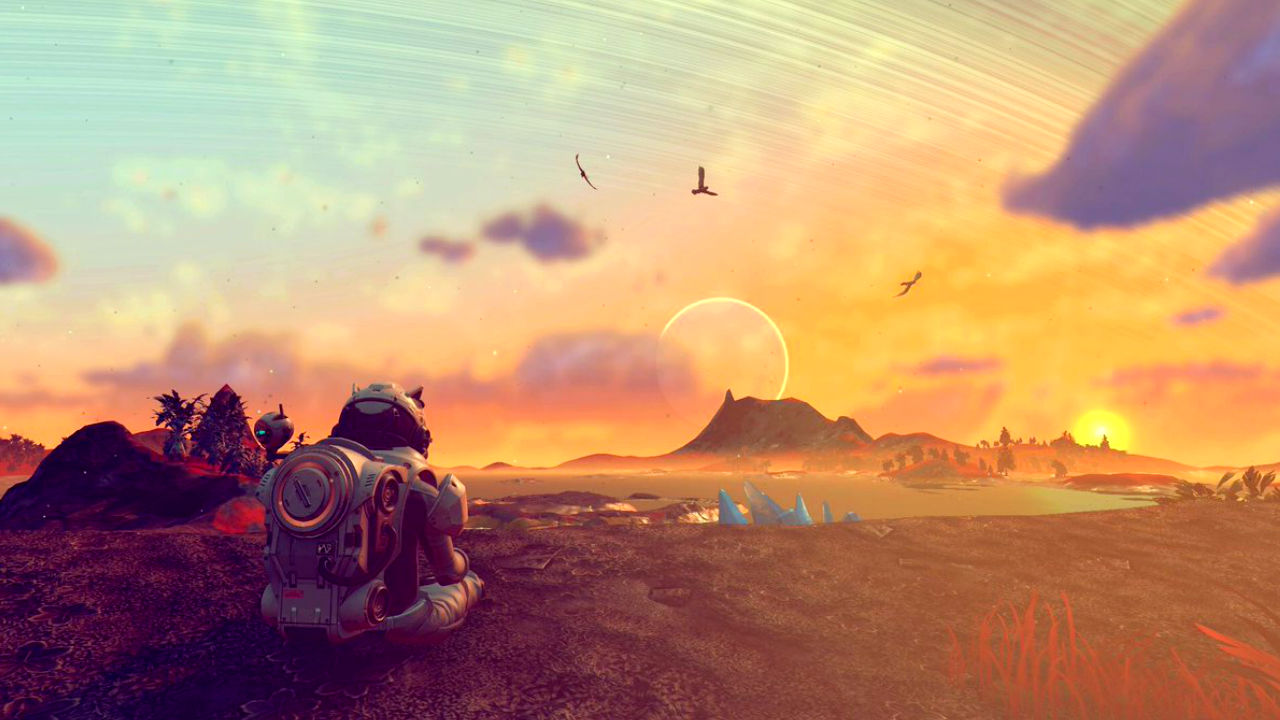
Because although I say this is a space where no-one can hear you scream, that's actually technically not true anymore. With the Next update came the long awaited multiplayer feature, that's 100% opt-in, opt-out, or left wonderfully open. You merely start you game with a door left open, inviting other players to join if they want, or you can jump straight into anyone else's game, discover their universes, their makeshift space homes. Everything is shared, from resources to space battles, but you can litter planets with glowing monument orbs for every other weary traveller you meet in a kind of beautiful, strangely eerie, perpetual memoriam.
For me though, it's not about the multiplayer. No Man's Sky is an escapist's game, one I use to unwind after a stressful week, one of those games like Stardew Valley or even Moonlighter that provides you with the kind of infinite gameplay loop that means you're suddenly wondering why it's 5am and you're still playing. You know that once you've set your mind to building this thing for your base, installing a weapon mod, or simply checking out what's over that hill, you're about to start a journey for all the resources. And there's always just one more thing to do that keeps you ever going forward.
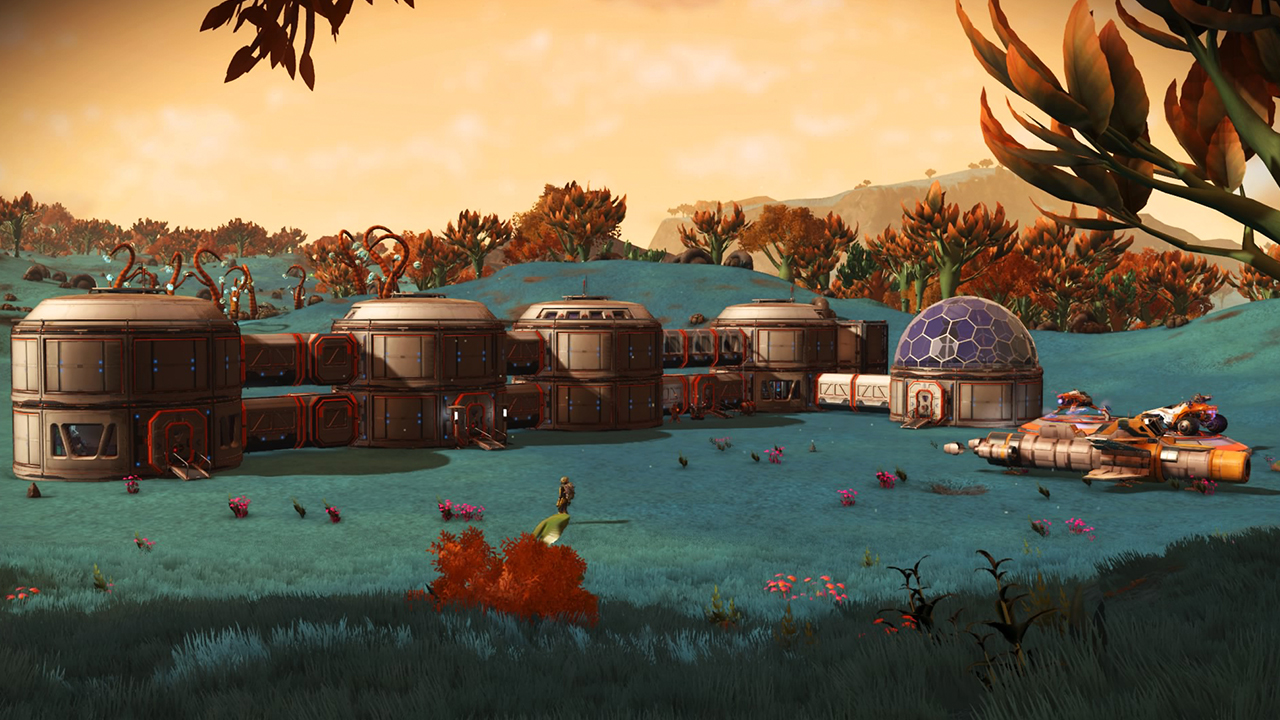
The base building could be more involved, as you're basically only capable of creating specialist stations, buildings, a farm and storage - at least as far as I've got in my base building quest - and the Sims' addict inside me wants to have my base kitted out the inside of the Normandy in Mass Effect, with sofas, beds, a bar and other such home comforts. But the plethora of missions that you'll get by building a base (and all that additional storage) make it so worth it. And being able to invite your friends over, despite the number of universes between you, is kind of incredible.
The procedural generation has seriously evolved since the game was first released back in 2016
So much has changed in No Man's Sky in two years, I honestly considered starting again when Next arrived, ditching my original space adventure to start afresh in an attempt to come at Next with a blank state, learning all the systems afresh. After all this is a game that's basically been reset - the universe has actually been reset - and players coming back to the game after years of hibernation will find that a lot of the tech they worked hard to get has now been rendered obsolete, good for nothing but scrap and some units (the main in-game currency). But it's actually been better to jump back in with my old ship, base and equipment to really get the full impact of how much has changed.
Not only can you customise your character now, and switch to third person views for both your ship and character separately for an even better look at your little traveller, but it's the vast amount of work on the environments - and that which dwell within them - where you'll see the biggest differences. The procedural generation has seriously evolved since the game was first released back in 2016. Now the variation between planets is astounding - just take a look at Sean Murray's various retweets for a plethora of planet variation examples - to the point that some planets are filled with iridescent bubbles, forests of fireflies, or rocks that look like the Quantum Realm from Ant-Man. And then there's the animals or whatever you can call the alien species that you'll find across the planets' surface. What I thought was a cluster of mushrooms turned out to have a face, and move not unlike a rabbit. While a reptile like thing had a flat face with a cartoonish grin. Utterly adorable the pair of them, and unlike anything I've ever seen in my previous two years with No Man's Sky. You're looking at procedural generation that moves away from the previous variation on a theme, to genuine WTF moments, to awe and intrigue, to exactly what you hoped it would be like exploring the galaxies.
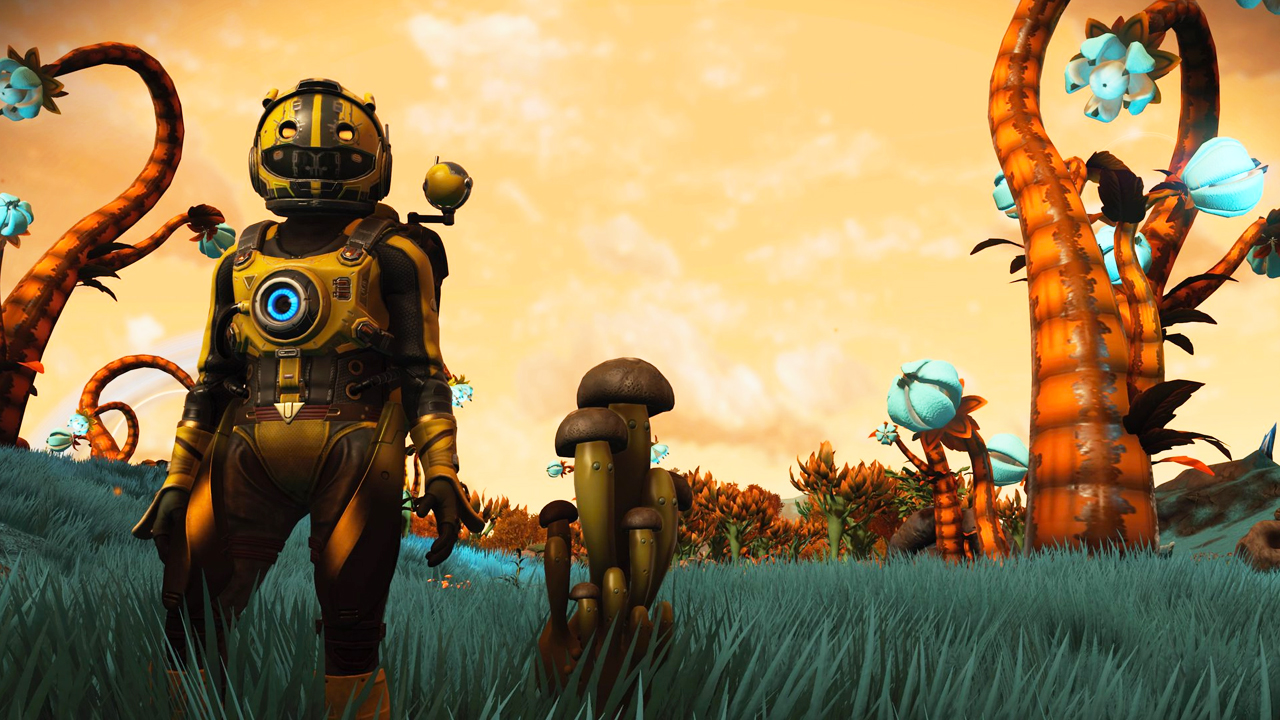
Of course, for a game of this size and scope, there are still things that will annoy you. The endless quest for resources can frustrate, especially when you've run out of launch thruster fuel in the heat of a sentinel chase, or you have no idea how to make Chromatic metal or find a pesky Atlas Pass v3. A lot of my questions from the original release remain too. Why are there no cities? Why is the entire universe only filled with a handful of alien races? Where do the Sentinels come from and why are they everywhere? But also, who are you? Where do you come from? And why is it up to you to travel the universe?
Yes, we all have a face now, a little pair of blinking eyes behind a wonderfully androgynous space helmet, but some questions remain. Thankfully, the entire experience of No Man's Sky, with its improved gameplay structure, simply stunning environs, the constant allure of universes beyond, the bases and the newfound friends, make up for those niggling questions, the occasional frustrations, and the bugs. It's refreshing to see the community excited by No Man's Sky again, because this is as close to Hello Games' original promise as we've ever been, and I couldn't be happier with the way it's all evolved.
What's next for No Man's Sky?
Although Hello Games is still too busy fixing many a bug that's arrived with the Next update to talk about what's in the future pipeline for the game, I'd love to see more advanced base building and better combat options for a future update. But we'll have to wait to see what's in our space exploring future.
For more intergalactic adventures, why not check out our pick of the best games like No Man's Sky.

Sam Loveridge is the Brand Director and former Global Editor-in-Chief of GamesRadar. She joined the team in August 2017. Sam came to GamesRadar after working at TrustedReviews, Digital Spy, and Fandom, following the completion of an MA in Journalism. In her time, she's also had appearances on The Guardian, BBC, and more. Her experience has seen her cover console and PC games, along with gaming hardware, for a decade, and for GamesRadar, she's in charge of the site's overall direction, managing the team, and making sure it's the best it can be. Her gaming passions lie with weird simulation games, big open-world RPGs, and beautifully crafted indies. She plays across all platforms, and specializes in titles like Pokemon, Assassin's Creed, The Sims, and more. Basically, she loves all games that aren't sports or fighting titles! In her spare time, Sam likes to live like Stardew Valley by cooking and baking, growing vegetables, and enjoying life in the countryside.



